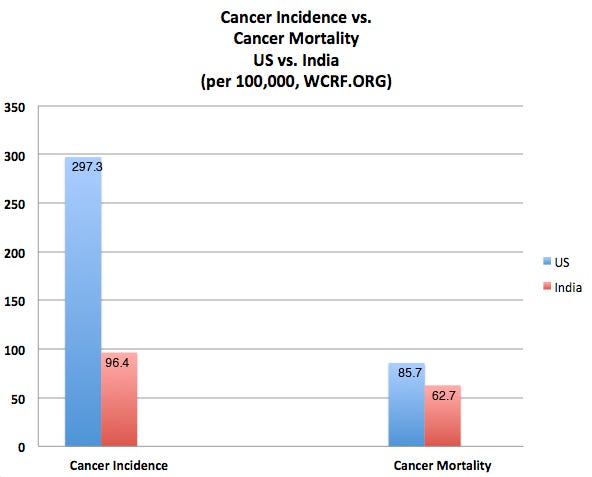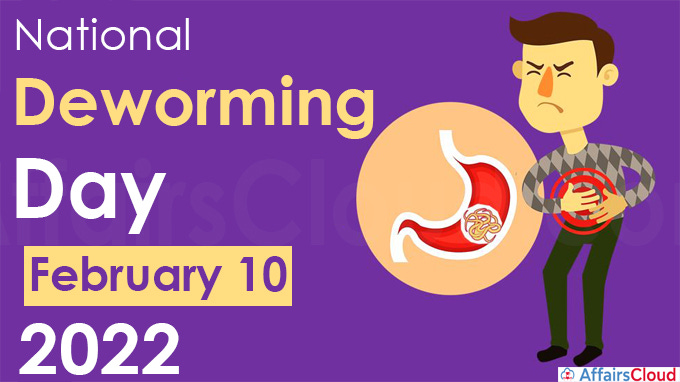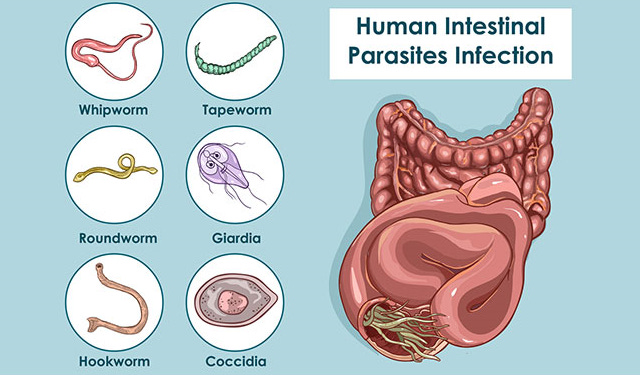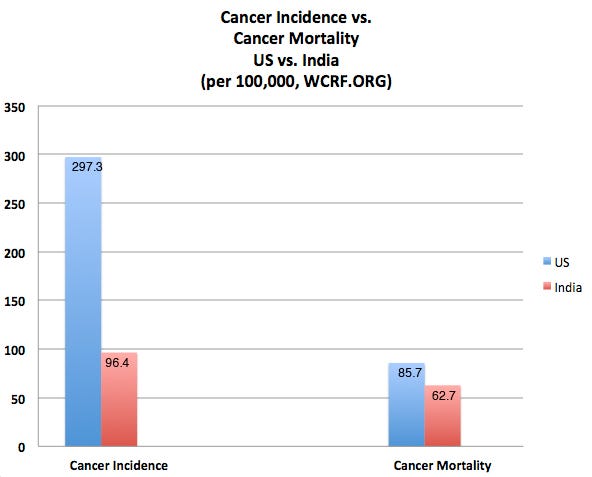Cancer, Deworming & Fenbendazole
Cancer is much less common in undeveloped nations; could regular deworming be the reason?
Fenbendazole Can Cure Cancer presents Case Reports of people who have treated their own cancers along with other articles to help understand how fenbendazole works. Previous articles covering other cancers are in the Archives link.
Deworming, Fenbendazole and Cancer
It’s amazing how things can be hidden in plain sight, seemingly disguised until you see them through the appropriate lens.
Did you know that the likelihood of getting cancer varies greatly depending on which country you live in? According to the World Cancer Research Foundation, using 2020 data, someone living in the United States has a 3 times GREATER likelihood of being diagnosed with cancer than someone living in India. See the Figure below.
Furthermore, just looking at India as an example, NutritionFacts.org points out that “overall cancer rates are much lower in India than in western countries. U.S. men get 23 times more prostate cancer than men in India. Americans get between 8 and 14 times the rate of melanoma, 10 to 11 times more colorectal cancer, 9 times more endometrial cancer, 7 to 17 times more lung cancer, 7 to 8 times more bladder cancer, 5 times more breast cancer, and 9 to 12 times more kidney cancer. This is not mere 5, 10, or 20 percent more, but 5, 10, or 20 times more. Hundreds of percent more breast cancer, thousands of percent more prostate cancer.” (link)
It’s not just that the US and India are outliers with respect to the differences in cancer incidence. The World Cancer Research Foundation (WCRF.org) statistics show that countries that would be considered more “developed” like the US, Germany, UK, and France all have around 3 TIMES the cancer incidence of countries considered “third world” like Congo, Afghanistan, Ethiopia and India. (To get a sense of the range of values, the most extreme difference in Cancer Incidence at over 4.4x is between Denmark 334.9/100k and Niger 76.4/100k.)
That’s really surprising since the US and other developed nations spend the most on health care. One would expect a corresponding benefit in terms of less sickness, especially from deadly diseases like cancer. In fact, it’s just the opposite with respect to cancer, the most feared and dreaded disease of all.
What are the potential reasons for this disparity in cancer incidence and what can we learn from it?
Why is India’s Cancer Incidence Rate So Low Compared to the US?
Whenever there is such a great disparity in cancer incidence between two groups the natural question to ask is “Why?” Some of the possible reasons are differences in measurement (reporting), dietary differences and environmental factors, among other reasons.
One possible environmental factor could be related to the use of deworming medication on a population-wide scale. In India, February 10th and August 10th of every year are National Deworming Days, an initiative of the Indian Ministry of Health, when children and adults are issued albendazole (fenbendazole functional equivalent) tablets (link). The use of deworming medication is encouraged by a Special Day in India, that’s how important it is. (Hallmark probably makes a card!) Based on the known anti-cancer properties of fenbendazole is it possible there is a link between India’s population-wide use of deworming medication and its low incidence of cancer?
Is Parasitic Worm Infestation Possible in the US?
In the United States, the subject of parasitic worms is largely ignored. Worms are the problems of other places like India, Africa, most of Asia, Mexico and other “developing nations.” In stark contrast to the US, these other countries recognize that humans, like animals, get worms and provide their populations deworming medications that are cheap and available over-the-counter without a prescription.
It is almost taboo in the US to talk about human parasites. Gross!… that’s for the poor unsanitary places, they’ll say. That’s for animals, they’ll say. Meanwhile, the worms thrive, giggling and wiggling inside us. Simply put, we as Americans may be in complete denial when it comes to parasite infestation.
Parasites are masters of survival. They infect everything. Jumping from species-to-species with ease. How about dog owners who “kiss” their pet? More like a direct dog-to-human worm transfer behavior. Parasites have nearly indestructible eggs and can form easily ingested cysts in meat and on vegetation. Parasites are in and on absolutely everything. Everything…the soil, the grass, the vegetables, the water. And list goes on and on. The point is that parasite infection is likely in all humans and denying that it exists won’t make it go away.
The Times of India (link) regularly covers worm infestation of both children and adults as it is a recurrent health issue. “Adult cases of intestinal worms usually arise out of eating street foods or improperly washed vegetables or uncooked meat. Treatment is usually simple, but early identification, particularly in children is important to prevent growth deficiencies and infant mortality. If you stay in an area or plan to visit an area where people are particularly prone to developing intestinal worms, it is good to do deworming at least once a year for both adults and children, and pay extra attention to hygiene.”
Studies show that deworming should be carried out among adults too (link). The European Journal Tropical Medicine and International Health, reported that hookworm infection can increase significantly with age, which makes adults equally, if not more, prone to infections (link).
Does the US have to worry about intestinal parasites?
Yes. A paper in The American Journal of Tropical Medicine & Hygiene found that almost half of the US samples screened for intestinal parasites contained at least one type and many samples had between one and four separate species of parasites. The author indicated that the trend in parasitic infection in the US was increasing. Interestingly, this study was done in 2000 with no follow-ups since (link).
People in the US most likely do have worms, but we don’t seem to want to treat them.
Cancer Incidence vs Cancer Mortality
Let’s bring back our first image. On the left, it shows that over 3 times as many people in the US get cancer compared to people in India. However, the death rate or Cancer Mortality is similar between the US and India (only 0.3 times more likely to die from cancer in the US vs India despite having such divergent starting points [297 vs 96]). So, despite starting from two very different points with respect to Cancer Incidence, the US and India end up in roughly the same place with respect to Cancer Mortality!
So what’s going on here?
Regarding Cancer Incidence, there is clearly a population-level variable that is different between the two nations that affects the development of cancer. What could that be? Until proven differently, albendazole (fenbendazole) with its known, potent anti-cancer properties is the likely candidate. India uses albendazole (fenbendazole) to treat parasites and has a low cancer rate while the US does not and it has one of the highest cancer rates in the world.
Could rampant, untreated parasites in Americans be causing the elevated rates of cancer? A possibility, but very unlikely because there isn’t a strong link between the presence of parasites and development of cancer. If there were such a relationship it would argue for regular deworming.
A more likely, and very probable explanation is that the lower cancer rates in the albendazole (fenbendazole) treated population (India) is a side effect, a happy accident, resulting from the National Deworming Day treatments.
It’s time to address the elephant in the room regarding the differences in Cancer Incidence and Cancer Mortality between the US and India. First, these data are well-known and readily available on the World Cancer Research Foundation website. Here’s the link to the dataset used. These differences are dramatic, easy to see and should be readily apparent to any scientist in the cancer “business.” The question is whether the scientists just aren’t connecting the dots or are they purposefully ignoring the obvious?
What albendazole (fenbendazole) does in India is drastically reduce the customer base for Big Pharma cancer treatments. If albendazole (fenbendazole) were given to the population in the US as it is in India, there would most likely be far fewer customers for Big Pharma cancer meds. India is a poor country (average per capita income is $2,170); expensive cancer drugs do not have much of a market amongst a poor population. The US is rich (average per capita income is $70,430), expensive cancer drugs reach an insured, affluent market.
Indirectly, the failure to use albendazole (fenbendazole) increases the incidence of cancer in the US thereby creating a larger customer base for expensive and often painful and debilitating cancer treatments. Yet, despite all the “miraculous, cutting edge” cancer treatments sold by Big Pharma, the Cancer Mortality rate is roughly the same between India and the US!
Takeaway Messages Regarding Fenbendazole and Cancer
Fenbendazole (albendazole) is safe. Entire populations take the drug! There are National Deworming Days in India.
Fenbendazole (albendazole) may prevent cancer.
Fenbendazole (albendazole) is kryptonite to the Big Pharma cancer industry.
Final Note
There are other potential interpretations of the observed differences in Cancer Incidence between India and the US. As mentioned earlier, dietary and detection differences are two of the most notable. Considering detection differences, the possibility that cancer screening and detection is less prevalent in India would lead to an undercount of Cancer Incidence. However, if that were true that error should carryover and manifest itself as a much larger Cancer Mortality number in India. Regarding dietary differences, as mentioned earlier a population-wide dietary difference is very unlikely since the low Cancer Incidence rates are found in drastically culturally diverse countries (and correspondingly different diets) like Congo, Afghanistan, Ethiopia and India. The main commonality that the low Cancer Incidence countries share is poverty.
The Fenbendazole “Lens”
Fenbendazole, with it’s potent anti-cancer properties, and the differential utilization of fenbendazole between countries that markedly differ in Cancer Incidence rates indicates most likely that fenbendazole is responsible for the observed effect of less cancer. As such, this observation of less cancer, coupled with the scientific data regarding fenbendazole as a cancer treatment, strongly suggests that fenbendazole also prevents cancer.
The working hypothesis/theory is that fenbendazole prevents cancer. Clearly it does not prevent all cancers. However, over time, we will learn the essential factors that influence the performance of fenbendazole as a cancer treatment and preventive agent.
To ask questions or offer suggestions, use the Leave a Comment link. If you want to present your Case Study privately, use fenbendazole77@gmail.com to reach us. If you know of someone who may benefit from learning about fenbendazole, share this with them by using the Share link, they must Subscribe (it’s free) to receive future articles.
References
Amin O. M. (2002). Seasonal prevalence of intestinal parasites in the United States during 2000. The American journal of tropical medicine and hygiene, 66(6), 799–803. https://doi.org/10.4269/ajtmh.2002.66.799 https://pubmed.ncbi.nlm.nih.gov/12224595/
Geiger, M. (2015). Why are cancer rates so low in India? https://nutritionfacts.org/2015/05/05/why-are-cancer-rates-so-low-in-india/)
Küster, T., et al. (2014). Activities of fenbendazole in comparison with albendazole against Echinococcus multilocularis metacestodes in vitro and in a murine infection model. International Journal of Antimicrobial Agents, 43(4), 335–342. https://doi.org/10.1016/j.ijantimicag.2014.01.013
Nwokolo, C. (2021) Health benefits of deworming regularly for adults. https://healthguide.ng/health-benefits-deworming-adults/
Nuwer, R. (2016). How a worm gave the South a bad name. https://www.pbs.org/wgbh/nova/article/how-a-worm-gave-the-south-a-bad-name/
Pradas, N. (2020). Deworming among adults: A necessary process. https://www.newindianexpress.com/cities/bengaluru/2020/feb/20/deworming-among-adults-a-necessary-process-2105741.html
Sharma, K. (2021). Regular deworming is important for both kids and adults. https://timesofindia.indiatimes.com/life-style/health-fitness/health-news/regular-deworming-is-important-for-both-kids-and-adults/articleshow/80788712.cms
Disclaimer:
Statements on this website have not been evaluated by the Food and Drug Administration. The contents of this website is for educational and informational purposes only and is not intended to be a substitute for professional medical advice, diagnosis or treatment. This website does not provide any kind of health or medical advice of any kind. Always seek the advice of your physician or other qualified health provider with any questions you may have regarding a medical condition. The case reports presented reflect the real-life experiences and opinions of other readers or users of the website. The experiences of those readers or users are personal to those particular readers/users and may not necessarily be representative of all readers/users. We do not claim, and you should not assume, that all other readers/users will have the same experiences. Do you own research, consult with relevant medical professionals before attempting to self-treat for any condition.







I think you're on the right track. Anything that causes increased inflammation, especially chronic inflammation, is a risk factor for the development of autoimmune disease and, if that autoimmune disease then runs rampant, cancer.
Yes, if so many people are infested with worms it makes you wonder what other conditions (non-cancerous) that fenbendazole can help. Irritable bowel syndrome comes to mind...